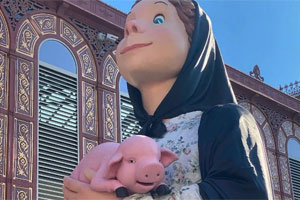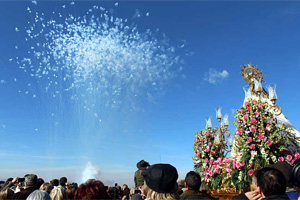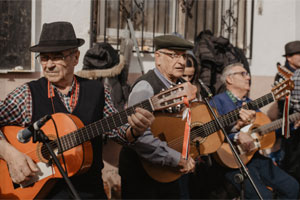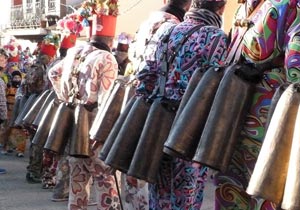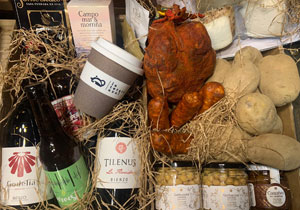Corpus Christi of Béjar and the Moss Men
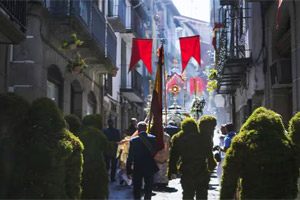
What is the celebration of Corpus Christi in Béjar and the Men of Moss?
In Béjar, during the Corpus Christi festival, a unique tradition known as "Los Hombres de Musgo" (the Moss Men) is celebrated. Surprisingly dressed in plant-based cloaks, several locals take part in and accompany the processional parade, which has led to this festivity being declared of National Tourist Interest.
On the morning of that day, it is worth witnessing the laborious process of dressing eight villagers in moss in the convent of San Francisco. Each one carries a vegetable wrapper that can weigh up to 12 kilos. Under a shower of petals and thyme, the procession, made up of authorities, members of the brotherhood, first communion children and moss men, walks through the streets. The parade ends in the Plaza Mayor, in front of the church of El Salvador, where the flags pay homage to the Blessed Sacrament.
The origins of this tradition are uncertain. According to an old legend, it is linked to the reconquest of the city by the Christians, when it was occupied by the Arabs. However, more recent studies link it to a 15th-century theatrical performance in the ducal domain of Béjar, which is connected to the universal tradition of the 'savage'.
The most widespread legend has it that, on the appointed day, the sentries opened the gates of the walls, causing the Muslims to flee, believing them to be vermin or monsters. When they realised their mistake, they shouted "treason, treachery! The legend of the Moss Men is set in the town of Béjar, in Salamanca, and is related to the Corpus Christi Procession, which takes place four weeks after Easter in June. This tradition commemorates the Christian conquest of the town and the stratagem used, which continues to attract attention both in the Middle Ages and today.
The legend behind the Moss Men
According to Bejar's oral tradition, when the Christians entered through the gates in the walls of Béjar, the Muslims thought they were strange creatures and fled, shouting "treason, treason! From that moment on, the gate through which the Christians entered was given the name of Puerta de la Traición (Gate of Treason). Other accounts mention that these events took place in honour of Saint Marina, on 17 June, and the Christians expelled the Muslims from the city. Over time, this celebration merged with the feast of Corpus Christi in the 14th century.
In addition, another tradition associated with this festivity is that of covering the streets with thyme, creating a carpet through which the procession passes. It is believed that the thyme blessed as the Blessed Sacrament passes by has the power to ward off lightning during storms, which is why people pick it up after the celebration.
Origin and History
According to legend, on the day of Santa Marina, the inhabitants of Béjar gathered on the La Centena estate, disguised in moss, and went to the Muslim fortress hiding behind their plant camouflage. Thanks to this stratagem, they managed to reconquer the city.
The Corpus Christi procession, instituted by Pope Urban IV in 1263, has been celebrated in Béjar since 1397. During the procession, the municipal councillors play the role of paying homage to the standard in the square. In addition, the procession of the Virgen del Castañar, which takes place on the Sunday after Corpus Christi Thursday, is one of the most popular and most attended by the faithful.
On the feast of Corpus Christi in Béjar, two notorious traditions are remembered. The first is the legend of the Men of Moss, passed down from generation to generation since the 12th century, which tells of the reconquest of Béjar by the Christians during Muslim rule. The second tradition is the carpet of thyme that is placed in the streets through which the procession passes and which, according to popular belief, has the power to protect against lightning during storms. Nowadays, the thyme used is removed by the municipal cleaning services after the event.
Corpus Christi
The Corpus Christi procession in Béjar has maintained its itinerary over the centuries, with the participation of public figures that no longer exist today. However, the Moss Men continue to be part of the municipal procession and parade alongside the band. The celebration culminates in the Plaza Mayor, where the flags are waved in front of the whole town. Afterwards, the Body of Christ is exposed in the church of El Salvador for eight days, under the vigilance of the cofrades.
Although this festivity is closely linked to the Christian religion, it is surprising that the legend of the Moss Men has been maintained over the centuries and has become a symbol of the town of Béjar. In addition, a pagan tradition is preserved in which the streets through which the procession passes are covered with thyme.
Once the procession has passed, the ground is blessed and people gather the thyme to protect their homes from the lightning of storms. The presence of this carpet of thyme adds further colour to the celebration of the Legend of the Moss Men.
What to see in Béjar
Béjar, located in the province of Salamanca, offers several places of interest to visit. Some of the main tourist attractions of the city are the following:
- The Ducal Palace: This is one of the most outstanding points of interest in Béjar. This impressive 16th century Renaissance palace has beautiful gardens and an ornate façade. It currently houses the Textile Museum, where collections related to the region's textile history are on display.
- El Castañar: This chestnut forest, located on the outskirts of Béjar, is an ideal place to enjoy nature and outdoor activities. It offers trails for walking or hiking, as well as picnic areas. During autumn, the forest is dressed in golden tones, creating a spectacular landscape.
- The Plaza Mayor: This is the heart of the town and a lively place where you will find numerous bars, restaurants and shops. The square is surrounded by historic buildings and has a central fountain. It is an ideal place to relax, enjoy the local gastronomy and observe the daily life of Béjar.
- The Sanctuary of Nuestra Señora del Castañar: This sanctuary, located on the outskirts of the town, is a place of pilgrimage and devotion. It offers impressive panoramic views of Béjar and its surroundings. In addition, every 8 September a festival is held in honour of the Virgen del Castañar, which attracts numerous visitors.
- The David Melul Jewish Museum: This small museum exhibits Jewish history and culture in Béjar. Through exhibits and documents, you can learn about the Jewish influence in the town during the Middle Ages.
These are just a few examples of the places of interest to visit in Béjar. The city also has other monuments and charming corners that are worth exploring.
Crafts and recommended shopping
In Béjar, there are several local crafts and products worth discovering and buying as souvenirs. Here are some of the craft and shopping recommendations:
- Textiles from Béjar: Béjar's textile tradition is well known and appreciated. You can find high quality textile products, such as blankets, fabrics and tapestries, made using traditional techniques. The Textile Museum, located in the Ducal Palace, is a good place to learn about this craft and buy authentic products.
- Ceramics: Béjar also produces ceramics of great beauty and quality. You can find decorative pieces, crockery and hand-painted tiles in different pottery shops in the city.
- Gastronomic products: Béjar and its surroundings are known for their quality gastronomic products. You can buy cold meats, such as Iberian ham and chorizo sausages, cheeses from the region and local honey, which are tasty and representative of the area.
- Leather crafts: In some shops in the town, you will find handmade leather products, such as bags, wallets, belts and footwear. These pieces are usually made by local artisans and stand out for their quality and design.
- Traditional handicrafts: In addition to those mentioned above, you can find other traditional handicrafts, such as basketry, woodwork and wrought iron products. These objects are often unique and reflect the skill and talent of the local craftsmen.
As you walk around Béjar, you will find shops, markets and fairs where you can buy these crafts and local products. Remember that supporting local craftspeople and traders helps to keep these traditions alive and to take back with you an authentic souvenir of your visit to the city.
What to eat in Béjar
The typical gastronomy of Béjar and the surrounding area is full of tasty and traditional dishes. Some of the popular culinary specialities of the area are:
- Judías del Barco de Ávila: This dish consists of a stew of white beans, generally accompanied by ingredients such as chorizo, black pudding, bacon and vegetables. It is a hearty and comforting dish, perfect for cold days.
- Calderillo Bejarano: This is a stew of meat, usually lamb, with potatoes, onion, pepper and spices. It is cooked slowly so that the meat becomes tender and the flavours blend perfectly.
- Hornazo: This is a kind of pie filled with different ingredients, such as chorizo, pork loin, ham, hard-boiled egg and spices. It is typical of Easter and is usually eaten as a quick meal or at picnics in the open air.
- Migas: This dish consists of fried breadcrumbs with pieces of bacon, chorizo, peppers and garlic. It is a traditional recipe that is usually enjoyed at breakfast or as a main dish.
- Traditional sweets: As for desserts, you must try the typical sweets of the area. Highlights include perrunillas, biscuits made with lard, flour, sugar and cinnamon, and flores dulces, fried doughnuts in the shape of a flower and covered in sugar.
In addition to these specialities, you can also enjoy the rich variety of Iberian cured meats, cheeses and wines of the region, which are renowned for their quality and flavour.
Exploring the local restaurants, tapas bars and markets is an excellent way to sample the authentic gastronomy of Béjar and discover the traditional flavours of the area.

